I P S (Leaky Gut Syndrome support) – 90 Capsules
*** Please Login or Register with DC Nutrition to see Prices and Add To Cart. ***
Login | Create An Account / Register
I P S, Intestinal Permeability Support, is a specialized supplement designed to stimulate repair and growth of the intestinal mucosa or the lining of the gut wall and aids in gut detoxification. Each capsule contains 600mg.
The intestine is the largest immune organ in the body with a full complement of immune cells. Physical or mental stress and nutritional status play key roles in intestinal health. If the intestinal wall epithelium becomes injured (LEAKY GUT SYNDROME), there results a downward spiral of events leading to chronic degenerative diseases including autoimmune disorders like Chronic Fatigue, Fibromyalgia, Lupus, Crohn's disease, etc.
This model emphasizes the importance of root causes of altered intestinal permeability.
The following are nutritional factors for the intestine:
1. L-Glutamine - supports the turnover of the intestinal epithelium and components of the immune system.
2. D-Glucosamine Sulfate - is a key building block of glycoproteins and glycosaminoglycans to make connective tissue that holds all the cells of the intestinal wall together. NOTE: Ingredients derived from Shrimp & Crab Shell
3. Glutathione - helps maintain the internal redox environment to inhibit the production of pro-inflammatory chemicals and acts as an antioxidant. This protects the intestinal wall.
4. Gamma Oryzanol - helps maintain the integrity and supports normal glandular activity of the stomach and intestinal wall.
5. Tillandsia - also known as Spanish Moss, provides specific micronutrients to support the growth of the cells of the intestinal wall as well as providing natural antimicrobial activity.
6. Jerusalem Artichoke - provides fructose polymers that serve as a ready source of fermentable fiber for the friendly intestinal bacteria. These also provide an energy source for the cells of the gut wall.
7. Cellulase - is a microbial enzyme that breaks down insoluble fiber into sugars that in turn provide more energy to the cells of the gut wall.
8. Glandular support - in the form of lamb intestine concentrate. Recent research shows that extracts of lamb intestine provide growth stimulators that are needed to repair the lining of the intestinal wall.
PRODUCT DESCRIPTION
IPS (intestinal Permeability Support Formula)
600mg
**Each capsule contains: L-Glutamine, Tillandsia, lamb intestine concentrate, glucosamine sulfate, gamma oryzanol, Jerusalem artichoke, Glutathione and cellulase.
WARNING: Not recommended for pregnant or lactating women.
SUGGESTED USE: Two (2) or three (3) capsules taken twice daily as a dietary supplement or as otherwise directed by a health care professional.
Contains: 90 Capsules
Product #: 6415
NDC: 55146-06415
ADDENDUM
I P S
Intestinal Permeability Support - A special dietary supplement
With a total surface area of the size of a tennis court, the intestine represents the major interface between the body and the environment. This huge area is designed to assure efficient uptake of nutrients; paradoxically, it must simultaneously exclude many substances to maintain health. Microorganisms, toxins, food allergens and endotoxins are routinely excluded by active and passive mechanisms: peristalsis and secretion of gastric acid and digestive enzymes move digested food through the GI tract, sterilize the luminal contents and break down antigens. Tight junctions maintain tissue integrity of the gut epithelium in order to limit uptake of substances between cells (paracellular uptake).
Immune exclusion is a key barrier function of the intestine
The intestine is the largest immune organ with a full complement of immune cells (T cells, B cells, mast cells, macrophages). It secretes large amounts of a specific antibody, secretory IgA (sIgA). sIgA binds specifically to antigens and microorganisms and prevents their attachment and uptake by the gut mucosa. Imbalanced immune function can alter intestinal permeability due to inflammation and decreased sIgA. Stress (physical or mental) and nutritional statuses play key roles in GI health. For example, stress decreases sIgA production, while physical injury leads to inflammation and the overproduction of reactive oxygen species (ROS). Phagocytic cells wage chemical warfare on invaders by surrounding foreign particles with superoxide, hydrogen peroxide and hypochlorite (bleach). Other highly reactive compounds include peroxynitrite, formed from nitric oxide and superoxide are implicated.
Altered intestinal permeability in a model for chronic disease
When the intestinal epithelium becomes injured, the resulting downward spiral of events can lead to chronic disease:
1. An initial event evokes mucosal damage: typical causes of altered gut permeability include alcohol, NSAIDs, infections, maldigestion, gut dysbiosis (imbalanced gut flora) and immunosuppression.
2. Penetration by xenobiotics and antigens due to increased permeability (leaky gut syndrome)
3. Reaction with host antibodies, circulating immune complexes
4. Autoimmune reactions
5. Compromised liver detoxication, toxin overload
6. Ultimately producing systemic conditions leading to degenerative disease
This model emphasizes the importance of root causes of altered intestinal permeability, especially oxidative stress. Oxidative stress generates reactive oxygen species which attack enzymes, DNA, polyunsaturated fatty acisHealthy intestinal flora also support optimal function. These bacteria, including lactobacillus species and bifidobacteria, help prevent intestinal overgrowth by undesirable organisms including yeast and potentially harmful bacteria. Bifidobacteria supports the maturation and maintenance of the immune system. Eubacteria benefit the intestine in other ways as well as, by synthesizing vitamins and antibacterial factors. Fermentation of undigested carbohydrate yields short chain fatty acids to fuel the intestine.
Nutritional factors for the intestine:
L-Glutamine. L-glutamine represents a major fuel for enterocytes. It possesses tropic effects for both the proximal and distal colon and its normalized intestinal electrolyte transport. In addition, glutamine supports tissues that turnover rapidly, such as the intestinal epithelium and components of the immune system. Oral glutamine supplementation has been shown to be effective in supporting the immune system. Furthermore, glutamine promotes sIgA production; sIgA levels drop dramatically in animals fed a glutamine free diet.
D-Glucosamine sulfate. Glucosamine is an amino sugar that is the progenitor of all hexosamines, key building blocks of the oligosaccharide chains of secreted glycoproteins and glycosaminoglycans. In turn glycosaminoglycans are key elements of connective tissue and the basement membrane to which the intestinal mucosa is anchored. Glycosaminoglycans also form the glycocalyx of the intestinal brush border. The glycocalyx, a viscous coating on the luminal surface, protects the underlying epithelium from friction and exposure to digestive enzymes and microorganisms. Alteration of sulfated glycosaminoglycans in the lamina propria and basement membrane has been observed in patients with Crohn's disease. Numerous studies have documented the uptake and efficacy of glucosamine sulfate. Glucosamine synthetase, the enzyme responsible for synthesizing glucosamine, is the first enzyme and rate-limiting step in the biosynthesis of N-acetylgalactosamine and sialic acid.
Glutathione. Glutathione is a tripeptide composed of cysteine, glycine and glutamate. It occurs in millimolar concentrations in the cytoplasm of most cells, where it exists mainly in the reduced form. Glutathione helps maintain the internal redox environment to inhibit the production of proinflammatory cytokines and to maintain protein sulfhydryl groups in the reduced state for maximal biological function. Reduced glutathione is a powerful antioxidant, able to quench free radicals and reactive oxygen species directly. Glutathione is a cofactor for glutathione peroxidases, which decompose cytoplasmic hydrogen peroxide and membrane lipid peroxides as a preventive measure. Lowered glutathione is linked to aging, decreased indices of health and increased susceptibility to oxidative stress. Orally administered glutathione can help normalize sperm mobility in cases of male infertility.
Gamma oryzanol. Originally obtained from rice oil, gamma oryzanol is made up of ferulic acid, a potent antioxidant, and phytosterol. Gamma oryzanol supports the integrity of the GI tract to balance proinflammatory stimuli and to support normal glandular activity of the stomach and intestine. The beneficial effects of«'tmma oryzanol have been reported.
Tillandsia. Tillandsia occurs as fibrous masses on bushes and tress (oak, pine, cypress) of coastal regions of the southern U.S. and the Gulf Coast. Tillandsia contains fiber, iron, phosphorus, calcium, magnesium, manganese, chlorophyll, beta-carotene and B vitamins. It also contains coumarin and resins believed to possess antimicrobial properties.
Jerusalem artichoke. Fructooligosaccharides occur naturally in a number of foods. These fructose polymers resist digestive enzymes and serve as a ready source of fermentable fiber for colonic bacteria. The fermentation process releases short chain fatty acids, including butyrate, which are primary energy sources for the colon. Fructooligosaccharides have been found to promote the growth of beneficial intestinal bacteria, especially bifidobacteria.
Cellulase. This microbial enzyme is effective in breaking down insoluble fiber to simple sugars that can be fermented to short chain fatty acids that nurture the colon.
Glandular support. Lamb intestine is processed under mild conditions by Biotics Research to preserve peptides, proteins and growth factors normally produced by the intestine. Recent research suggested the presence of novel growth stimulators of intestinal epithelial cells located in the small intestine.

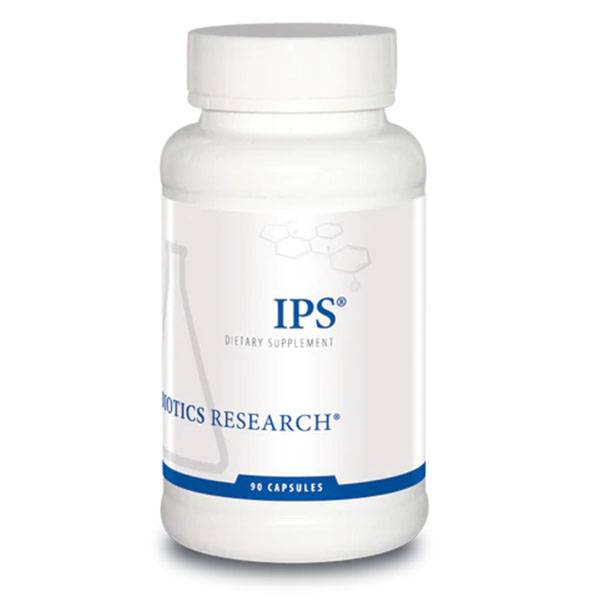
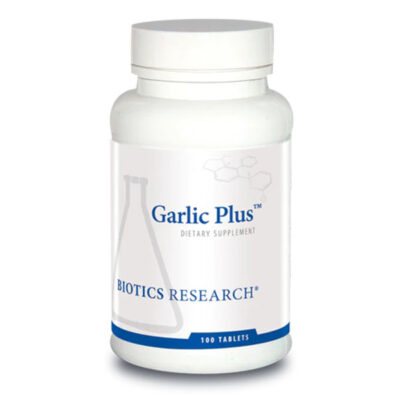
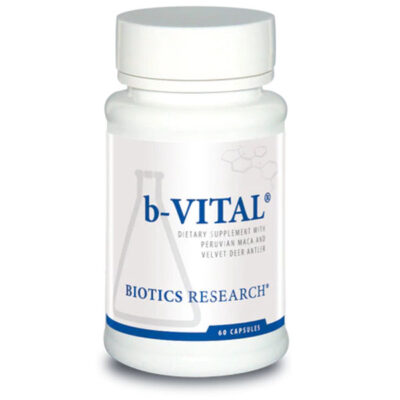
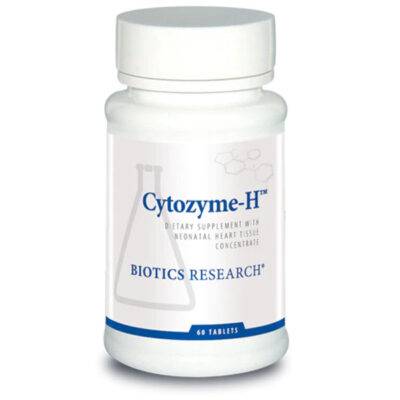
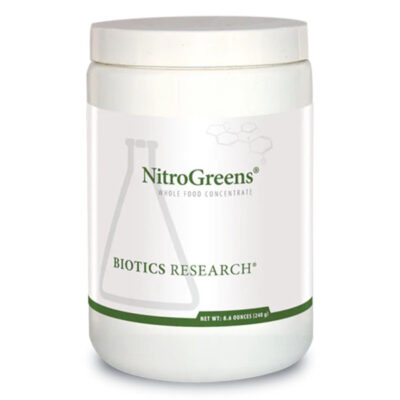
Reviews
There are no reviews yet.